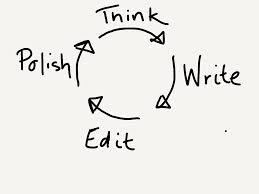The Craft of Writing: Part I
This article was written by Meredith Allard for the HonorSociety.org Elevate e-magazine. This series features top featured writers from theHonorSociety.org writing program. The original article can be found here.
In some of my previous posts, I talked about how to submit your writing if you’re looking to be published either during or after your university studies. Now let’s talk about the nuts and bolts that go into your writing prior to the submission process. Remember, you should make sure your writing is the very best it can be before you send it out to editors and readers.
Last year I was invited to speak at Writers Block, a group of students interested in becoming writers. When I asked what the group wanted to learn about, the answer came back overwhelmingly that they wanted to learn more about the writing craft itself. Here are some of the ideas I shared. There’s nothing earth shattering here, but I think the writers found it useful because it opened their eyes, perhaps for the first time, to the fact that writing requires work.
To Begin:
Write something wonderful that people will want to read. This sounds obvious, but oddly it’s the step that some writers skip over in their rush to be read. Yes, wonderful is subjective, but if you have a strong grasp of the art and craft of writing, then you’re more likely to win fans with your work. It also helps to learn to be the best judge of your own work.
Find your own voice and your own perspective. What do you have to offer that no one else does? How are you different or unique? That’s your strength. Use it.
Read a lot. If you don’t like to read, then writing is not for you. Read stories similar to the ones you want to write. Read about writing. Read about writers. Read the classics. Read your favorite genre. Read the cereal box. Read everything.
Be sure to proofread your work—check for spelling errors and grammatical mistakes. Don’t rely on spell check. I can’t stress this enough—sloppy writing will get your work rejected by editors and deleted by readers. Yes, I speak from experience (as both the editor, and, I’m sure, as the writer whose work evaporated into cyberspace).
Have someone else (or many someone elses) read your writing and listen to what they have to say. Often, as writers we get stuck in our own heads and we forget that the point of writing is to communicate with others. Just because someone offers a criticism doesn’t mean we have to listen to it, but if more than one person has the same idea for improvement, it might be worth seeing if there’s something to the suggestion.
Read your writing out loud to listen for the music of your language. Remember, we write for the ear, not for the eye. You could have the most perfect looking story or poem—sharp margins, professional looking layout, lovely font—but if the words don’t sound right then they’re not right.
It takes time, sometimes a lot of time, to create a strong piece of writing. Give yourself time to grow into the writer you want to be.
First drafts are never publishable (or usually even second drafts or third drafts or fourth drafts…). If you’re not willing to take the time to make sure your writing is the very best it can be before you send it out into the world, then writing is not for you.
Next, Part II.















You must be logged in to post a comment Login